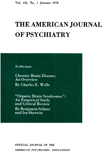LATE RESULTS OF ORBITAL UNDERCUTTING
Abstract
1. Psychosurgery continues to have definite applications, especially in the involutional and cyclic depressions, the agitated states of the elderly, the better preserved schizophrenics, and the intractable psychoneuroses, especially when suffering from anxiety or tension.
2. It is preferred to shock treatment in those depressions requiring more than short courses of shock treatment because of less emotional blunting, memory loss and relapses.
3. Agitated depressed senile states react more favorably to limited lobotomy operations than those in the younger age group.
4. Complete lobotomy has been replaced by limited selective operations. Undercutting of the orbital cortex offers the advantage of a precise technique under direct vision in an area causing appreciable lift in mood, lessening of anxiety and a minimum personality blunting.
5. The late results in orbital undercutting when studied in the separate categories of depressions, agitated senile states, schizophrenia, pseudoneurotic schizophrenia and intractable psychoneurosis have in most cases continued to show an improvement rather than regression or relapse. It has done so to a far greater degree than was anticipated, especially in schizophrenic patients of high cultural background.
6. Complications, including seizure formation, occur in the early rather than the late follow-up studies.
Access content
To read the fulltext, please use one of the options below to sign in or purchase access.- Personal login
- Institutional Login
- Sign in via OpenAthens
- Register for access
-
Please login/register if you wish to pair your device and check access availability.
Not a subscriber?
PsychiatryOnline subscription options offer access to the DSM-5 library, books, journals, CME, and patient resources. This all-in-one virtual library provides psychiatrists and mental health professionals with key resources for diagnosis, treatment, research, and professional development.
Need more help? PsychiatryOnline Customer Service may be reached by emailing [email protected] or by calling 800-368-5777 (in the U.S.) or 703-907-7322 (outside the U.S.).



